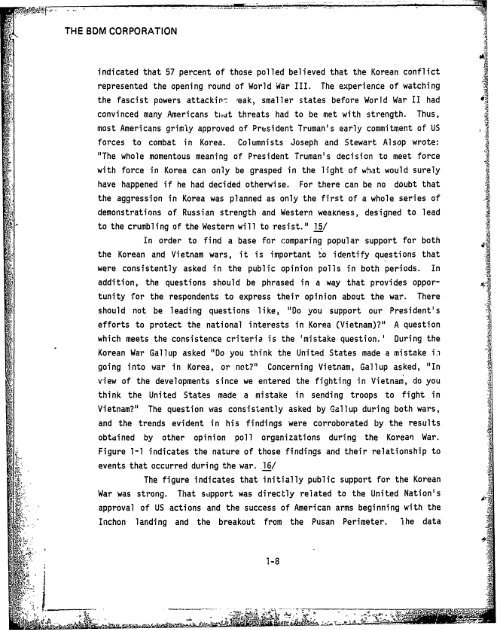policy - The Black Vault
policy - The Black Vault
policy - The Black Vault
Create successful ePaper yourself
Turn your PDF publications into a flip-book with our unique Google optimized e-Paper software.
THE BDM CORPORATION<br />
indicated that 57 percent of those polled believed that the Korean conflict<br />
represented the opening round of World War III. <strong>The</strong> experience of watching<br />
the fascist powers attackiprv<br />
,eak, smaller states before World War II had<br />
convinced many Americans tidt threats had to be met with strength.<br />
most Americans grimly approved of President Truman's early commitment of US 13<br />
forces to combat in Korea. Columnists Joseph and Stewart Alsop wrote:<br />
Thus,<br />
"<strong>The</strong> whole momentous meaning of President Truman's decision to meet force<br />
with force in Korea can only be grasped in the light of what would surely<br />
have happened if he had decided otherwise. For there can be no doubt that<br />
the aggression in Korea was planned as only the first of a whole series of<br />
demonstrations of Russian strength and Western weaKness,<br />
designed to lead<br />
to the crumbling of the Western will to resist." 15/<br />
in order to find a base for comparing popular support for both<br />
the Korean and Vietnam wars, it is important to identify questions that<br />
were consistently asked in the public opinion polls in both periods. In<br />
addition, the questions should be phrased in a way that provides opportunity<br />
for the respondents to express their opinion about the war.<br />
should not be leading questions like, "Do<br />
<strong>The</strong>re<br />
you support our President's<br />
efforts to protect the national interests in Korea (Vietnam)?"<br />
which meets the consistence criteria is the 'mistake question.'<br />
A question<br />
During the<br />
Korean War Gallup asked "Do you think the United States made a mistake i.1<br />
going into war in Korea, or not?" Concerning Vietnam, Gallup asked, "In<br />
view of the developments since we entered the fighting in Vietnam, do you<br />
think the United States made<br />
Vietnam?"<br />
a mistake in sending troops to fight in<br />
<strong>The</strong> question was consistently asked by Gallup during both wars,<br />
and the trends evident in his findings were corroborated by the results<br />
obtdined by other opinion poll organizations during the Korean War.<br />
Figure 1-1 indicates the nature of those findings and their relationship to<br />
events that occurred during the war. 16/<br />
<strong>The</strong> figure indicates that initially public support for the Korean<br />
War was strong. That suipport was directly related to the United Nation's<br />
approval of US actions and the success of American arms beginning with the<br />
Inchon landing and the breakout from the Pusan Perimeter. ihe data<br />
V<br />
1-8<br />
____.
















